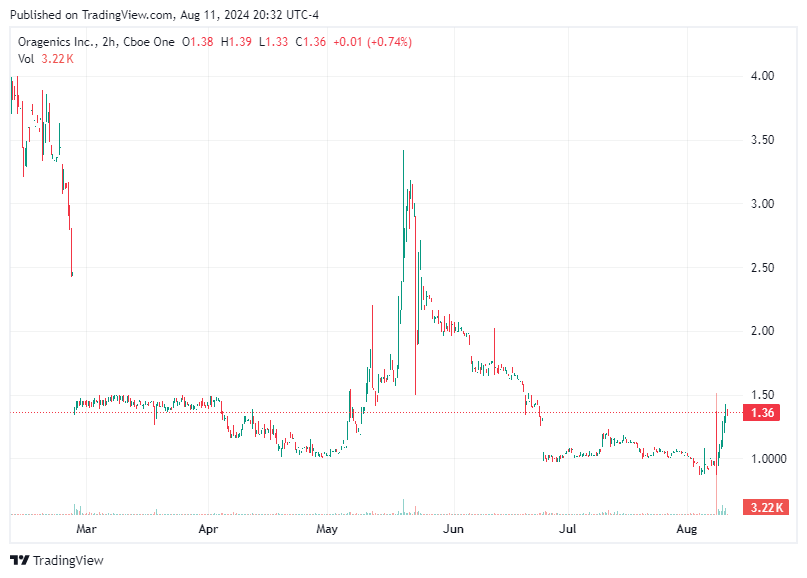Medical Company's Concussion Treatment Clears FDA-Required Cardiotoxicity Testing
Oragenics Inc. and Their Recent Announcement on ONP-002.

Disclaimer: The following article aims to provide detailed and neutral information regarding Oragenics Inc.'s announcement about their concussion drug, ONP-002. This is for informational purposes only and should not be considered medical advice or a promotional endorsement.
Real-time information is available daily at https://stockregion.net
Oragenics Inc. (NYSE: OGEN) recently made a major announcement regarding their lead candidate for concussion treatment, ONP-002. On Thursday, the company revealed that ONP-002 had successfully cleared the FDA-required cardiotoxicity testing. The announcement signals progress toward addressing a unmet medical need in the management and treatment of concussions.
Understanding ONP-002: A New Chemical Entity
ONP-002 is classified as a new chemical entity (NCE), specifically designed to target the brain. Its unique delivery method involves administering the drug through the nasal cavity, allowing it to travel directly to the brain. This innovative approach aims to enhance the drug's efficacy in treating concussions, which are a type of mild traumatic brain injury (TBI) that affects brain function. The nasal delivery system is intended to maximize the drug's impact while minimizing systemic exposure, potentially reducing the risk of side effects in other parts of the body.
Before any new drug can proceed to clinical trials, the FDA mandates comprehensive testing to ensure the drug does not exhibit cardiotoxicity. These tests are critical as they assess the drug's potential to cause adverse effects on the heart, such as electrical malfunctions that could lead to arrhythmias (irregular heartbeats). Cardiotoxicity testing typically involves studying the drug's interaction with cardiac receptors and its effects on ion channels, which are essential for maintaining normal heart function.
Oragenics conducted hERG ion channel studies for ONP-002 under Good Laboratory Practices (GLP) in collaboration with Charles River Laboratories (NYSE: CRL). The hERG (human Ether-à-go-go-Related Gene) channel is a critical component of cardiac electrophysiology, and its inhibition can lead to serious cardiac arrhythmias. The studies revealed that inhibitory concentrations of ONP-002 were greater than 10 micromolar, indicating a low risk of cardiotoxicity. These results align with previous non-GLP hERG studies, reinforcing the drug's safety profile.
Based on Phase 1 clinical trial dosing and subsequent blood plasma concentrations, ONP-002 is anticipated to have a large cardiac safety margin. This means that at the dosages used in clinical trials, the drug is unlikely to cause cardiac arrhythmias. The findings suggest that ONP-002 could be a safe treatment option for concussions, providing reassurance that the drug's benefits outweigh the risks associated with its use.
Concussions: Causes, Prevalence, and Unmet Medical Need
Concussions are a common form of mild traumatic brain injury, often resulting from falls, motor vehicle accidents, and contact sports. They can impact brain function, leading to symptoms such as headache, dizziness, confusion, and memory loss. Despite their prevalence, effective treatments for concussions remain limited, highlighting a significant unmet medical need. According to estimates, approximately 69 million cases of concussion are reported annually worldwide.
The economic burden of concussions and TBIs is substantial. The Centers for Disease Control and Prevention (CDC) reports that the total annual healthcare cost for nonfatal TBIs exceeds $40.6 billion. This figure includes direct medical expenses and indirect costs such as lost productivity and long-term care. The financial impact of concussions extends beyond the healthcare system, affecting individuals, families, and society as a whole. Post-concussion symptoms can persist in up to 20% of affected individuals, leading to long-term disability and a decreased quality of life. These symptoms may include persistent headache, cognitive impairments, mood disturbances, and sleep disorders. Oragenics has announced plans for a Phase 2 study to further assess the safety, feasibility, and effectiveness of ONP-002 in concussed patients. This study will involve analyzing patient blood biomarker profiles and functional outcomes to determine the drug's impact on concussion symptoms. The Phase 2 study represents a critical step in the clinical development of ONP-002, as it will provide valuable data on the drug's therapeutic potential and guide future research efforts.
In June, Oragenics completed the prototype of an automated intranasal device designed for use in concussed patients. This device aims to facilitate the administration of ONP-002 in patients who are initially confused, dazed, or unconscious following a concussion. The automated delivery system is intended to ensure timely and accurate dosing, which is crucial during the acute phase of injury. The development of this device highlights Oragenics' commitment to improving concussion treatment and patient care.
By advancing this innovative therapy through rigorous testing and clinical trials, Oragenics is addressing a critical unmet medical need and working toward improving outcomes for individuals affected by concussions.
Disclaimer: This article is intended for informational purposes only and should not be considered medical advice or a promotional endorsement. Always consult a healthcare professional for medical advice and treatment.
Real-time information is available daily at https://stockregion.net

